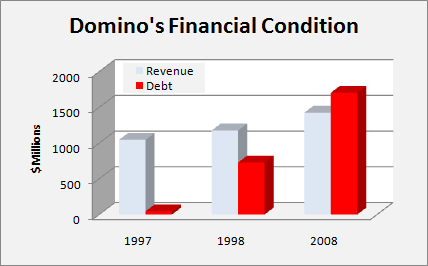Will Pizza Exec Brandon Deliver as Michigan Athletic Director?
What can we learn about David A. Brandon from his tenure at Domino's Pizza?
Michigan's pick for Athletic Director, David A. Brandon, is tasked with keeping Michigan athletics the"leaders and best", and while I wish him the best of luck in his new position, his legacy at Domino's Pizza leaves questions as to whether short-term thinking for fast food will provide Michigan athletics the long-term results Michigan fans expect.
How Brandon Managed Domino's Financial Condition
First and foremost, Domino's is a business, and it follows therefore that the primary measure of any CEO be the performance of the business. Modest (albeit unspectacular) revenue growth and profitability over Brandon's tenure seem to indicate an adequate job running the business operationally, however examining how the business' financial position has been eroded over the past ten years reveals some serious concerns about Brandon's stewardship.

In 1997, A year prior to Brandon's arrival, Domino's original founder Tom Monaghan sold the company to Boston private equity firm Bain Capital. Bain, whose founding partners include presidential candidate Mitt Romney, immediately began extracting as much cash from the company as it could, having Domino's borrow three-quarters of a billion dollars (nearly a year's revenue), and then immediately extracting nearly all of the borrowed cash from the company. By the time Brandon arrived in 1998, Bain's "recapitalization" of Domino's had already saddled the company with a significant debt load, and the company's course as a highly-leveraged, cash-poor business had been set.
During his tenure as CEO, Brandon did not improve Domino's balance sheet. To the contrary, he continued to borrow money using Domino's good standing, and continued to pay Bain and the company's other owners large cash distributions, bolstering their rates of return at the expense of the long-term viability of the business. The reason for this is clear: Brandon worked for Bain and the other owners of the company whose interest were in short-term returns, and not on building long-term value in Domino's as a business. By the end of 2008, four years after its IPO, Domino's debt had ballooned to a whopping $1.7 billion. Presently, the company's entire market capitalization stands at $500 million, just a fraction of their overall debt, a fraction of the borrowed cash that has been extracted to date, and with the majority of the company's profits going toward paying interest on their debt.
Strictly speaking, Brandon did do his job of generating high returns effectively in the short-term. But his his job apparently did not include maintaining the long-term viability of the business, as most of the value has been extracted from the company's balance sheet, and the long-term financial prospects of the company are far worse than when he joined.
Squandering Domino's Most Important Asset
 Domino's new ads admit pizzas are "void of flavor". See the complete video at http://www.pizzaturnaround.com/ |
A Box of Dried-Out Crust
While running Domino's, Brandon seems to have consistently chosen to look for near-term results at the expense of long-term viability. He's facilitated its owners leveraging the company to the hilt, while leaving a brand image so maligned that their advertising now apologetically admits that the company's product tastes like cardboard. Like children who eat only the cheese and toppings off a pizza, he's left a box full of dried-out crust.
And while Brandon's actions were standard operating procedure at companies across America, the fact that he helped turn a thriving American success story into a debt-laden corporate zombie is not the skill set we need in Michigan's athletic department. We should be setting a higher standard for Michigan's next Athletic Director, and find someone who understands how to build excellence for the long-haul.
That's my $0.02.
© 2010 smitherspoon.com